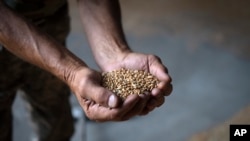Today, we are experiencing a global hunger crisis of unprecedented proportions. According to the World Food Programme, in just two years, the number of people facing, or at risk of, acute food insecurity increased from 135 million in 53 countries to 345 million in 79 countries in 2023.
Two major events are driving this crisis, according to Cary Fowler, the United States State Department’s Special Envoy for Global Food Security. “Climate is certainly one of them,” said Dr. Fowler. “We’ve had 532 consecutive months in which the global average temperature for the month exceeded the 20th century average.”
What’s worse, for the past two years, we have benefitted from the La Nina cooling weather phenomenon. But in 2023, we lost that advantage. “We’re now going into an El Niño period, a warming trend that typically affects tropical countries more than temperate countries … In other words, this is not business as usual for agriculture,” said Dr. Fowler
Russia’s war in Ukraine is the second major driver of food insecurity, particularly Vladimir Putin’s decision to pull out of the Black Sea Grain Initiative, said Dr. Fowler. “What are the impacts on the degrading of Ukrainian agriculture and export by Russia?”
“Among the top 15 importers of Ukrainian grain are a number of developing countries with quite high percentages of childhood stunting … A majority of countries on Earth are in fact net food importers – 131 out of 196 countries are net food importers,” he said.
“Countries in the Global South really need our help in terms of developing their agricultural food systems. They need strengthened food security,” said Dr. Fowler.
One of the more promising possibilities is the Vision for Adapted Crops and Soils program, co-sponsored by the Food and Agriculture Organization of the UN and the African Union, said Dr. Fowler:
“We’re working with African governments to identify the traditional and indigenous crops that … have the most potential for adding to nutrition … in Africa. We are assessing how they are likely to perform in a climate-changed Africa, which we can see already. And this will provide the basis for our working with African countries in crop improvement programs for those crops.”
“We’re taking a [long] view of trying to address the food insecurity problems,” said Dr. Fowler. “We do not need to be taking grain and food off of markets; we need to be helping countries strengthen their food security.”






